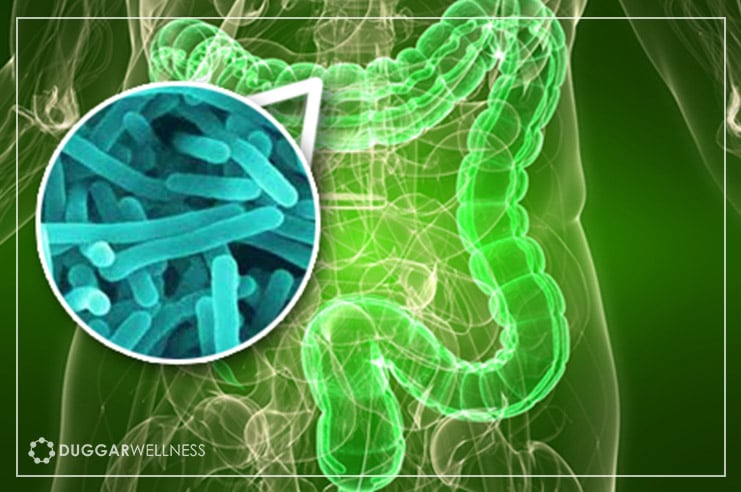If you’ve followed us for a while you will not be surprised that digestive issues are some of the most common things we see in the clinic. We’ve posted on gut-related issues a couple of times before (like here and here).
What may be surprising to some though is just how often even those without obvious digestive symptoms, actually have an underlying gut problem that is causing or contributing to their main complaint. for example, both fatigue and weight loss are more often than not related to gut problems. Let’s explore the reasons.
Replace
You’ve heard it said that “you are what you eat” but that isn’t really true. In reality “you are what you absorb”. Our bodies are in a constant state of breakdown and repair. Every cell is replaced at least every year (many cells are replaced every few minutes). The basic building blocks of each cell come from nutrients that we absorb from the food we eat. This simple awareness shifts the discussion beyond “diet” and focuses our attention on how well we are digesting our foods. With this concept in mind, you can see how even a “good” diet can have limited benefits if we aren’t able to get access to these nutrients.
When we put food into our mouths, we initiate a complex, multi-organ system that has to work together to accomplish its task. We might think of the organs of digestion as a relay-race team. In a relay race, each member of the team has their own leg of the race to run and then they pass the baton off to the next runner. If the first runner is slow or drops the baton, it will compromise the entire team.
On our Digestion relay race team, problems in the stomach – like insufficient levels of hydrochloric acid or infections – can lead to poor initiation of digestion. When things aren’t broken down well in the stomach it becomes nearly impossible for the small intestine and gall bladder to work effectively. When they aren’t working, it has an impact on the environment in the large intestine. Simply put, upstream events affect all downstream events. When proper digestive juices aren’t being produced it becomes imperative to REPLACE them via supplementation.
Remove
One of the key roles of adequate stomach acid is to prevent bacterial infection from the food we eat. As a general rule, it is important to recognize the importance of the microbes in our gut and how they impact health. Just how many microbes are there within us? You are made up of about ten trillion cells – but there are about a hundred trillion microbial cells in and on your body. That means that what you think of as “you” is actually mostly “not you”.
Balancing this environment, called the microbiome, is crucial to our health. Science is proving that our diet and lifestyle have a powerful effect on these microbes. When we have an overgrowth of harmful types of microbes, like mold, fungi, parasites, and opportunistic bacteria, we need to REMOVE them. We’ve become so accustomed to thinking that antibiotics are helpful for our health but they come with a heavy unintended consequence of killing off our friendly bacteria. That leaves us vulnerable to yeast and other types of microbes to overgrow. So that means we need to use other novel approaches to address bacterial overgrowth and use herbs and other formulas to eliminate mold, fungus, and parasites.
Rebalance
While we are busy removing or killing off the unfriendly microbes in our gut it is critical to REBALANCE the friendly probiotics in our gut. Taking a probiotic formula every day in addition to eating a gut microbe-friendly diet with fermented foods and a low processed food diet can help to bring the levels of friendly bacteria back up to normal healthy levels.
Rebuild
One of the other interesting things that we’ve learned about the digestive tract is that approximately 70% of our immune system resides there. When our guts are out of balance, it promotes inflammation and irritation to the entire gut lining. The gut lining is only 1 cell layer thick so when there is inflammation present, these cells get damaged we need to add specific nutrients to REBUILD the damage to these cells. Bone broths and other “functional foods” are helpful to add to the diet in addition to herbs like slippery elm, marshmallow root, aloe vera, and others.
This basic 4R approach of Replace, Remove, Rebalance, and Rebuild – has stood the test of time as a model for addressing digestive problems. Although the specifics change from patient to patient, when we focus on the root causes and explore the entire system holistically, we are able to help a myriad of really challenging symptoms.
 160 N Main, Bountiful, UT 84010
160 N Main, Bountiful, UT 84010  801-677-7878
801-677-7878


3 responses to “Why Digestive Health is Key”
[…] the years, our office has built a solid reputation for helping people with very nasty, chronic digestive issues. One of the many triggers for a breakdown in gut health is the development of food […]
[…] and Diet on SARS-CoV-2 Infection: Nanotechnology Roles I’ve written on the importance of a healthy gut microbiome on our immune function before, and now many scientists are researching the microbiome’s impact on […]
[…] Digestive system health. Research is showing that the makeup of the intestinal microorganisms play a big role in what foods you choose to eat and how efficiently they are processed. […]